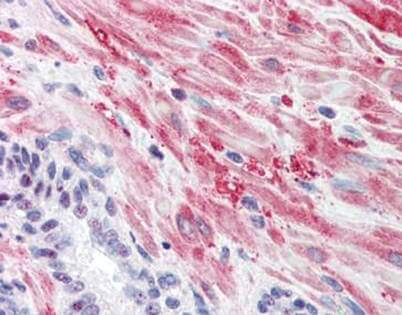Anti-Muscle Glycogen Synthase pS641 (RABBIT) Antibody
Glycogen Synthase 1 phospho S641 Antibody
- SPECIFICATION
- CITATIONS
- PROTOCOLS
- BACKGROUND

| Host | Rabbit |
|---|---|
| Conjugate | Unconjugated |
| Target Species | Human |
| Reactivity | Human, Mouse |
| Clonality | Polyclonal |
Application
| WB, IHC, E, I, LCI |
| Application Note | This phospho specific polyclonal antibody was tested by immunoblotting, immunohistochemistry, and ELISA. By ELISA the antibody was found to be reactive with the phosphorylated form of the immunizing peptide and minimally reactive with the non-phosphorylated form of the immunizing peptide. Immunoblotting will detect human and mouse muscle glycogen synthase. Although not tested, this antibody is likely functional in immunoprecipitation. |
| Physical State | Liquid (sterile filtered) |
| Buffer | 0.02 M Potassium Phosphate, 0.15 M Sodium Chloride, pH 7.2 |
| Immunogen | Human Muscle Glycogen Synthase phospho peptide corresponding to a S641 region of the human protein conjugated to Keyhole Limpet Hemocyanin (KLH). |
| Preservative | 0.01% (w/v) Sodium Azide |
| Gene ID | 2997 |
|---|---|
| Other Names | 2997 |
| Purity | Phospho Glycogen Synthase pS641 antibody is directed against human muscle glycogen synthase. The product was affinity purified from monospecific antiserum by immunoaffinity purification. Antiserum was first purified against the phosphorylated form of the immunizing peptide. The resultant affinity purified antibody was then cross-adsorbed against the non-phosphorylated form of the immunizing peptide. This phospho specific polyclonal antibody is specific for phosphorylated pS641 of human muscle glycogen synthase. Reactivity with non-phosphorylated human muscle glycogen synthase is less than 1% by ELISA. Cross reactivity with muscle glycogen synthase occurs in mouse tissue. Reactivity with muscle glycogen synthase from other sources has not been determined. |
| Storage Condition | Store Phospho GYS Antibody at -20° C prior to opening. Aliquot contents and freeze at -20° C or below for extended storage. Avoid cycles of freezing and thawing. Centrifuge product if not completely clear after standing at room temperature. This product is stable for several weeks at 4° C as an undiluted liquid. Dilute only prior to immediate use. |
| Precautions Note | This product is for research use only and is not intended for therapeutic or diagnostic applications. |
| Name | GYS1 (HGNC:4706) |
|---|---|
| Synonyms | GYS |
| Function | Glycogen synthase participates in the glycogen biosynthetic process along with glycogenin and glycogen branching enzyme. Extends the primer composed of a few glucose units formed by glycogenin by adding new glucose units to it. In this context, glycogen synthase transfers the glycosyl residue from UDP-Glc to the non-reducing end of alpha-1,4-glucan. |
| Tissue Location | Expressed in skeletal muscle and most other cell types where glycogen is present. |

Thousands of laboratories across the world have published research that depended on the performance of antibodies from Abcepta to advance their research. Check out links to articles that cite our products in major peer-reviewed journals, organized by research category.
info@abcepta.com, and receive a free "I Love Antibodies" mug.
Provided below are standard protocols that you may find useful for product applications.
Background
Anti-Glycogen synthase 1 pS641 is validated by IHC, Western Blot and ELISA. Human muscle glycogen synthase (GS) is responsible for the biosynthesis of glycogen from phosphorylated glucose units. Mammalian liver and muscle contain GS consisting of four subunits with a total molecular weight of 360,000. GS is subject to regulation through both allosteric and covalent modification and occurs in two forms: the phosphorylated inactive form, and the dephosphorylated active form. GS is inactivated by the serine/threonine kinase called glycogen synthase kinase-3b that mainly functions to phosphorylate muscle glycogen synthase. This antibody is specific for the phosphorylated form of GS at S641. Phosphorylation of GS at S641 has been associated with Antiphospholipid Antibody Syndrome.
If you have used an Abcepta product and would like to share how it has performed, please click on the "Submit Review" button and provide the requested information. Our staff will examine and post your review and contact you if needed.
If you have any additional inquiries please email technical services at tech@abcepta.com.













 Foundational characteristics of cancer include proliferation, angiogenesis, migration, evasion of apoptosis, and cellular immortality. Find key markers for these cellular processes and antibodies to detect them.
Foundational characteristics of cancer include proliferation, angiogenesis, migration, evasion of apoptosis, and cellular immortality. Find key markers for these cellular processes and antibodies to detect them. The SUMOplot™ Analysis Program predicts and scores sumoylation sites in your protein. SUMOylation is a post-translational modification involved in various cellular processes, such as nuclear-cytosolic transport, transcriptional regulation, apoptosis, protein stability, response to stress, and progression through the cell cycle.
The SUMOplot™ Analysis Program predicts and scores sumoylation sites in your protein. SUMOylation is a post-translational modification involved in various cellular processes, such as nuclear-cytosolic transport, transcriptional regulation, apoptosis, protein stability, response to stress, and progression through the cell cycle. The Autophagy Receptor Motif Plotter predicts and scores autophagy receptor binding sites in your protein. Identifying proteins connected to this pathway is critical to understanding the role of autophagy in physiological as well as pathological processes such as development, differentiation, neurodegenerative diseases, stress, infection, and cancer.
The Autophagy Receptor Motif Plotter predicts and scores autophagy receptor binding sites in your protein. Identifying proteins connected to this pathway is critical to understanding the role of autophagy in physiological as well as pathological processes such as development, differentiation, neurodegenerative diseases, stress, infection, and cancer.


